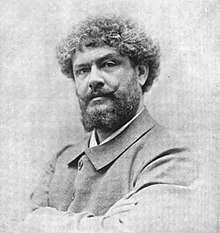Jean Richepin
| Jean Richepin | |
|---|---|
 | |
| Born |
4 February 1849 Médéa, French Algeria |
| Died |
12 December 1926 (aged 77) Paris, France |
| Occupation | Poet, novelist and dramatist |
|
| |
| Signature |
|
| French literature |
|---|
| by category |
| French literary history |
| French writers |
|
| Portals |
|
Jean Richepin (French pronunciation: [ʒɑ̃ ʁiʃpɛ̃]; 4 February 1849 – 12 December 1926), French poet, novelist and dramatist, the son of an army doctor, was born at Médéa, French Algeria.
At school and at the École Normale Supérieure he gave evidence of brilliant, if somewhat undisciplined, powers, for which he found physical vent in different directions—first as a franc-tireur in the Franco-German War, and afterwards as actor, sailor and stevedore—and an intellectual outlet in the writing of poems, plays and novels which vividly reflected his erratic but unmistakable talent. A play, L'Étoile, written by him in collaboration with André Gill (1840–1885), was produced in 1873; but Richepin was virtually unknown until the publication, in 1876, of a volume of verse entitled La Chanson des gueux, when his outspokenness resulted in his being imprisoned and fined for outrage aux mœurs.[1]
The same quality characterized his succeeding volumes of verse: Les Caresses (1877), Les Blasphèmes (1884), La Mer (1886), Mes paradis (1894), La Bombarde (1899). His novels have developed in style from the morbidity and brutality of Les morts bizarres (1876), La Glu (1881) and Le Pavé (1883) to the more thoughtful psychology of Madame André (1878), Sophie Monnier (1884), Cisarine (1888), L'Aîné (1893), Grandes amoureuses (1896) and La Gibasse (1899), and the more simple portrayal of life in Miarka (1883), Les Braves Gens (1886), Truandailles (1890), La Miseloque (1892) and Flamboche (1895).
His plays, though occasionally marred by his characteristic propensity for dramatic violence of thought and language, constitute in many respects his best work. During the 1880s he had an affair with Sarah Bernhardt, the greatest actress of the time.
Most of these were produced at the Comédie française. He also wrote Miarka (1905), adapted from his novel, for the music of Alexandre Georges, and Le mage (1891) for the music of Jules Massenet. A friend of Emmanuel Chabrier, he helped the composer to correct and salvage the libretto of Le roi malgré lui, as well as providing the words for La Sulamite. In addition, his novel La Glu was the basis for an opera by Gabriel Dupont as well as one by Camille Erlanger. A friend of Arthur Rimbaud, he was one of only "seven known recipients" of the first edition of A Season in Hell.[2]
_-_La_Glu.jpg)
He died in Paris. His son, Jacques was also a dramatist.
Bibliography
- Nana Sahib (1883)
- Monsieur Scapin (1886)
- Le Flibustier (1888; the basis for an opera of the same name by César Cui)
- Par le glaive (1892)
- Vers la joie (1894)
- Le Chemineau (1897)
- Le Chien de garde (1898)
- Les Truands (1899)
- Don Quichotte (1905)
- L'Aile, Roman des Temps Nouveaux (1911) translated as The Wing by Brian Stableford (2011) ISBN 978-1-61227-053-1
- Nouvelle Mythologie Illustree, Tome I & II (1920)
- Le Coin des Fous (1921) translated as The Crazy Corner by Brian Stableford (2013) ISBN 978-1-61227-142-2
Notes
- ↑ Yve-Plessis, R. Bibliographie raisonée l'argot et de la langue verte en France du xv au xx siècle (Paris, 1901), p. 128.
- ↑ Robb (2001), p. 233: Rimbaud gave the others to his mother, Paul Verlaine, Raoul Ponchon, Ernest Delahaye, Jean-Louis Forain and Ernest Millot.
References

- Robb, Graham (2000), Rimbaud, New York: W.W. Norton & Co, ISBN 978-0330482820
Further reading
- Arnold Guyot Cameron (1905). Selections from Jean Richepin, Silver, Burdett and Co.
- Kate Hyde Dunbar (1939). Jean Richepin, Poet and Dramatist, University of Georgia.
- Harry E. Wedeck (1947). "The Last of the French Bohemian Poets," The Modern Language Journal, Vol. 31, No. 8.
- Howard Sutton (1961). The Life and Work of Jean Richepin, Librairie Droz.
External links
- Works by Jean Richepin, at Gallica